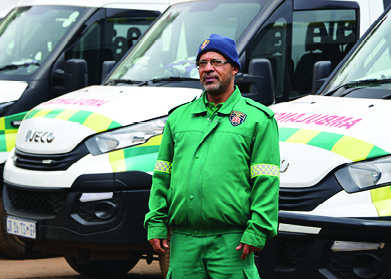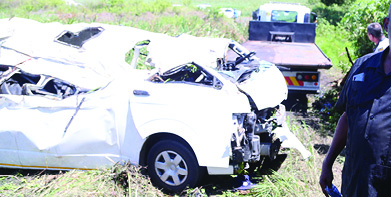Saving lives is all in a day’s work for paramedics
Saving lives is all in a day’s work for paramedics UrsulaA Gauteng paramedic, who has seen countless road traumas, says people must take more care when driving. 
Shakeel Dawson, who is an advanced life support paramedic for the Gauteng Department of Health, has witnessed people being injured and losing their lives due to recklessness on the roads and drinking while driving.
“Respecting the rules of the roads is common sense because it has dire consequences."
Dawson added that some of the negative impacts of reckless driving result in death and trauma.
Dawson, from Benoni in Gauteng, has been in the Emergency Medical Services field for over 28 years.
He says that it is not only the accident scenes and the fatalities that paramedics deal with that are upsetting, but also the after-effects of the consequences of reckless driving.
“It’s also the patient’s family that we need to deal with; by having to explain how the patient lost their life,” says Dawson.
He adds that reckless driving affects so many people.
“Sometimes a driver who caused the accident survives the crash, but goes through a lot mentally.
Dawson said that it not just an accident scene, but an alteration to another human’s life.
He pleaded with motorists to wear their seatbelts and make sure their vehicles are roadworthy.
Pedestrians on the other hand, must wear bright colour clothes or a reflective jacket and limit walking on the highway instead make use of bridges. 
A rewarding profession
If you would like to be a paramedic, Dawson advices that you must be physically and mentally fit.
He said paramedics are trained to perform medical rescue and to take care of the patients in the ambulance, while they are transferred to or between hospitals.
Dawson says being an emergency worker is rewarding, but it can take a toll on one’s mental strength, because of the tragedy that is witnessed.
He however, added that they do debrief after being at the accident scene and talk about what they have witnessed.
He explains that there are three types of paramedics in South Africa.
Basic life support paramedics are trained in cardiopulmonary resuscitation, which is commonly known as CPR. This is an emergency lifesaving technique performed when the heart stops beating. They also are trained to stop heavy bleeding and can deliver babies.
Intermediate life support paramedics can administer all the elements of basic life support, can insert a drip, provide shock treatment and do chest decompressions when a patient is struggling to breathe.
The duties of an advanced life support paramedic such as Dawson, include basic and intermediate life support. Furthermore, they can assist people who have heart conditions and are authorised to administer medication and injections.
Want to become a paramedic?
If you would like to become a paramedic, you will need to have mathematics and science as school subjects and will need to obtain a qualification from an accredited institution.
As of February 2020, the following institutions are accredited to offer paramedic qualifications by the Health Professions Council of South Africa:
- City of Johannesburg Emergency Services Academy
- Netcare Hospital Management
- School for Military Health Training
- University of Johannesburg
- Sefako Makgatho Health Sciences University
- Northern Cape College of Emergency Care
- Free State College of Emergency Care
- Durban University of Technology
- Nelson Mandela University
- Cape Peninsula University of Technology
- Mediclinic Private Higher Education Institution
- Western Cape Government College of Emergency Care